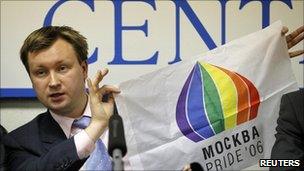European court fines Russia for banning gay parades
- Published

The leading campaigner Nikolai Alexeyev has welcomed the court's decision
The European Court of Human Rights has fined Russia for banning gay parades in Moscow, in an important victory for the country's gay community.
A leading activist, Nikolai Alexeyev, brought the case after the city authorities repeatedly rejected his requests to organise marches.
The Moscow authorities had argued the parades would cause a violent reaction.
But the court in Strasbourg said Russia had discriminated against Mr Alexeyev on grounds of sexual orientation.
It said that by refusing to allow the parades, the authorities had "effectively approved of and supported groups who had called for (their) disruption".
"The mere risk of a demonstration creating a disturbance was not sufficient to justify its ban," the court said.
It ordered Russia to pay Mr Alexeyev 29,510 euros ($41,090) in damages and for legal fees.
"This is a crippling blow to Russian homophobia on all accounts," Mr Alexeyev said after the verdict was announced.
"The authorities now have to ensure the security of peaceful gay activists, and must allow our protests to take place in Moscow or any other city in Russia. We will be applying to hold a sixth gay pride event in Moscow in May 2011," he told the BBC's Russian service.
"We'll be taking the former Moscow mayor Yuri Luzhkov to court: he broke the law by blocking our protests. We'll also be looking to hold to account those judges who continuously came to unlawful verdicts against us."
"Satanic"
Gay rights campaigners say that in recent years, the authorities in Moscow and other major cities have rejected hundreds of requests for parades.
Some activists who have tried marching in the capital without permission have come under attack from right-wing and religious groups, or were beaten up by police.
Yuri Luzhkov, who was mayor of Moscow for 18 years before he was sacked last month by President Dmitry Medvedev, described homosexuals as "satanic".
The ruling by the European Court of Human Rights referred specifically to Mr Luzhkov's views.
"The court could not disregard the strong personal opinions publicly expressed by the Moscow mayor and the undeniable link between those statements and the bans," it said.
Analysts say it is not yet clear if the new mayor, Sergei Sobyanin, will take a softer line on gay rights.
- Published28 September 2010